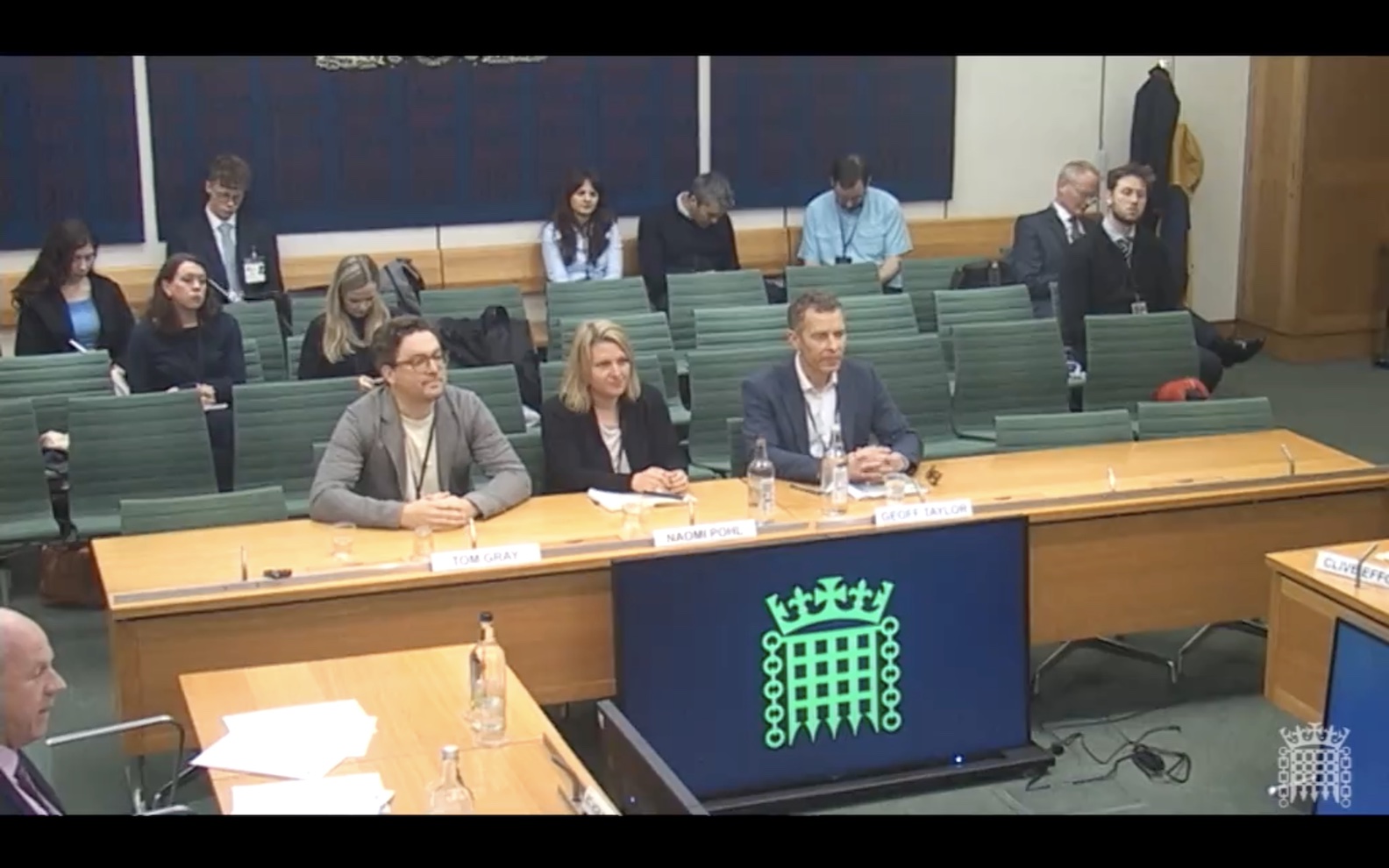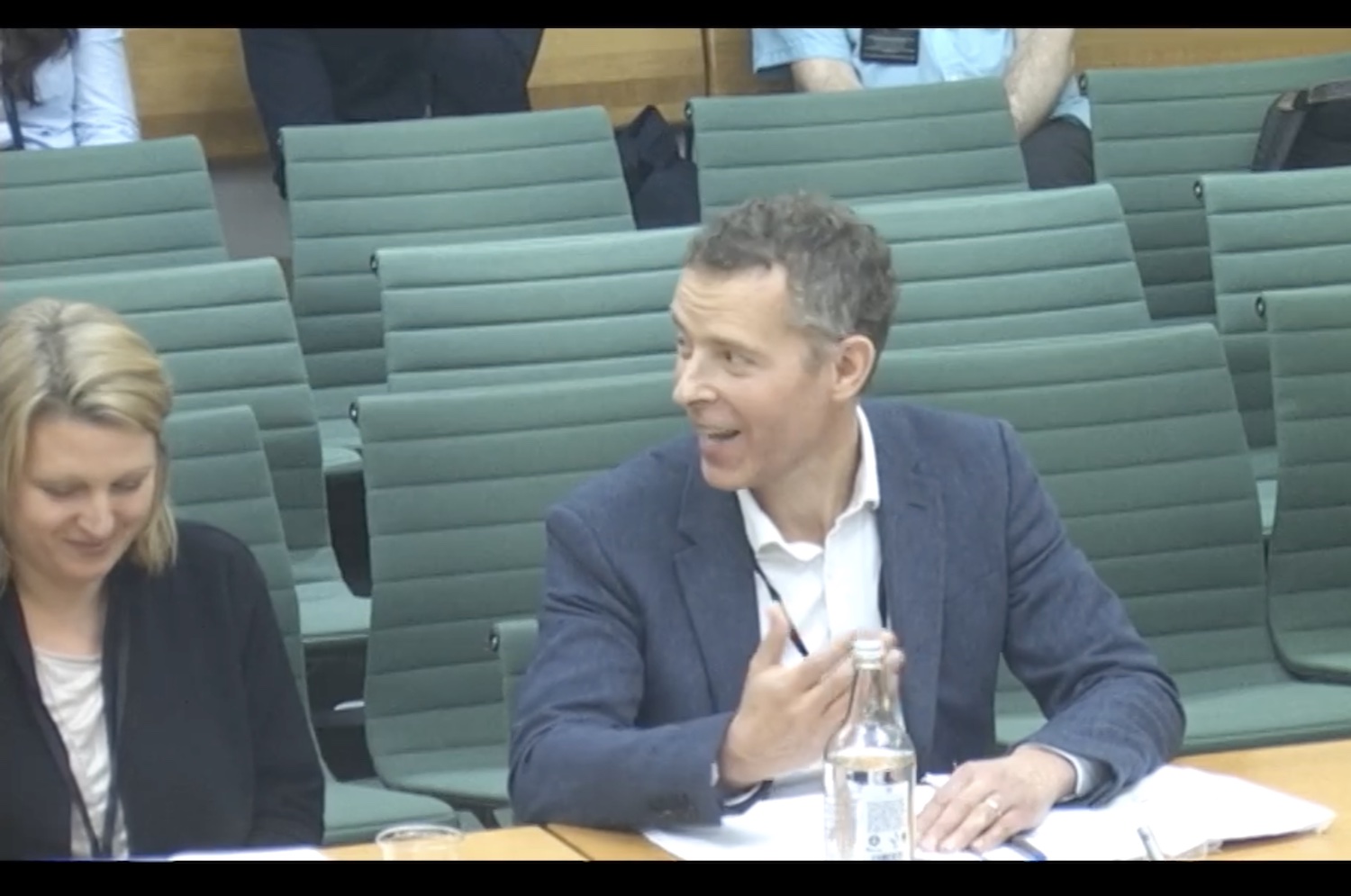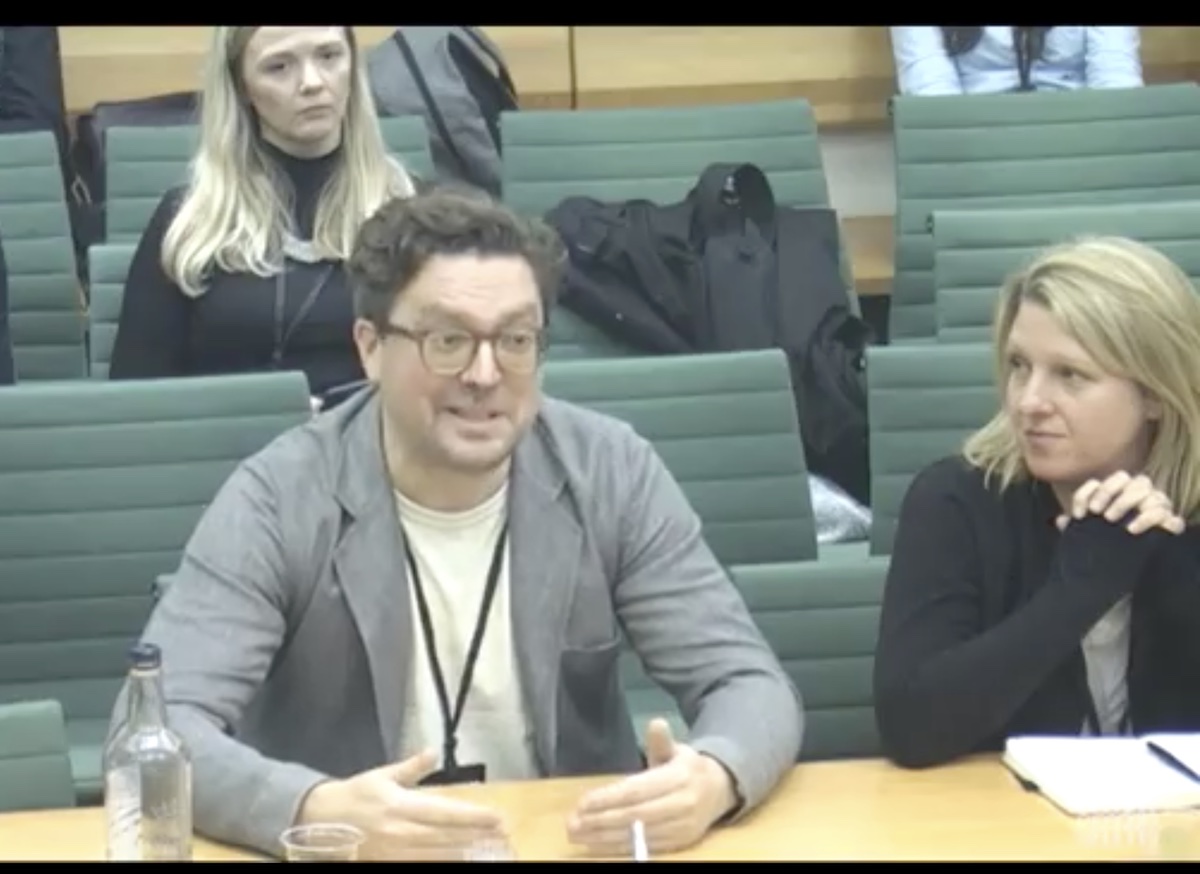One year on from the far-reaching inquiry into the economics of streaming, the DCMS Committee reconvened on the issue to hear on what progress has been made for artists, musicians and songwriters.
While there was a febrile atmosphere last year as the stark divisions were laid bare, some of the heat was removed from the debate by the interim report this year from the Competitions & Markets Authority, which found no case for intervening in the UK music industry.
However, the central arguments continue and three key figures in the debate were called upon to share insights and updates: Ivors Academy chair Tom Gray (then #BrokenRecord campaign leader), Musicians’ Union general secretary Naomi Pohl (previously deputy) and BPI chief exec Geoff Taylor (departing in the months ahead). For Gray and Taylor, it was a return visit to MPs, albeit in person this time.
Despite the CMA interim report, there is still a lot going on with the government’s Intellectual Property Office leading a working group with key stakeholders, which is set to introduce a transparency code, new data standards for song royalties and research reports on contract adjustment, equitable remuneration and rights reversion. All three trade body/union representatives agreed it should be done by the summer.
“My hope is that we can get to a deal, I'm working tremendously hard to try and make sure that is the case,” said Taylor.
However, remuneration is not specifically on its agenda.
Here, Music Week rounds up some of the key issues in the hearing, which brought together - perhaps a little awkwardly - Tom Gray and Naomi Pohl from one side of the debate with labels’ representative Geoff Taylor on the other for a discussion that ranged from regulation and contracts to Taylor Swift and K-pop…
‘STREAMING RESET’
For those campaigning for changes to the industry model, this session was a timely reminder that the DCMS’ Committee’s report last year called for a “complete reset” of streaming.
Thanking the committee for its report, Ivors Academy chair Tom Gray bemoaned the fact that the “political will that is needed to bring about the profound change that you instructed us to do is not there”.
“I don’t think that we’re getting anywhere close to a complete reset,” said Naomi Pohl, MU general secretary. “We’re very keen to see stronger commitments and we would be in favour of some form of regulation.”
“The committee identified a problem and we’re not anywhere close to getting a solution,” added Pohl, who called for a package of measures including a minimum digital royalty, upfront payments for session musicians, and the introduction of equitable remuneration for streaming (or a suitable alternative).

“The whole job of the record industry is supporting artists,” said BPI boss Geoff Taylor. “There’s been a lot of good progress and a huge amount of engagement.”
Inevitably, Taylor had a tougher time with MPs and chair Julian Knight halted his answers on a number of occasions in order to press him on solutions from the industry.
Taylor could refer to the significant industry moves on wiping out debts to help legacy artists earn from streaming. He also revealed that the industry was in negotiations with the Musicians’ Union on improved fees for session musicians.
REMUNERATION
“The big issue - the elephant in the room - is fair remuneration for music creators,” declared Pohl. While many artists have questioned their earnings from streaming, songwriters earn an even smaller share of the streaming pie.
But Taylor suggested that streaming has helped songwriters with the publishers’ overall share of revenue increasing from below 10% in the physical era to around 15-16% now. Even if that partly reflects vastly reduced costs in distribution and production for labels, he said that there were new costs for recorded music in the streaming ecosystem.
“Ultimately songwriters and publishers have been the biggest winners from streaming,” Taylor told the committee.
The BPI boss also suggested any agreed code for the industry could improve transparency, although he defended confidentiality clauses on the basis of competition.
“The code could provide for artists and songwriters to be given - on a more proactive basis - communication when new deals are struck,” he said.

Taylor was stopped once again as he reeled off stats to underline the success of artists in the streaming market under the current model. But he was at least praised for frankness when asked if he would commit to negotiating over remuneration.
“I won't make that commitment for a good reason, which is that the terms that are negotiated with artists are a factor of competition - the key factor of competition - in our marketplace,” said Taylor. “I think that is best done, individually, between artists and their managers and their labels in a competitive marketplace. The CMA has found that the marketplace for that is competitive and that is the right place to do it. I don't believe that the right solution to the issues that have been raised is some kind of standardised, collectivised replacement of the market with some industry and government-sponsored process. That’s my view.”
“The truth is that there is no reason not to introduce minimum royalty rates into the market,” countered Tom Gray. “It should be on the table.” The Ivors chair also noted that while unrecouped advances may have been wiped out in some cases, the royalty rates on that streaming income could be lower than artists might have hoped for.
For a trade unionist like Pohl, a minimum royalty is akin to a minimum wage - a protection for workers in a creative industry.
“We've got over 70 collective bargaining agreements, and we set minimums,” she said. “So it's not anti-competitive because people can always pay above the minimum if they want to. So I personally think that’s a good solution.”
RADIO CONTROL
Once again, discussion returned to a collective industry agreement on royalties for recorded music - a system of so-called equitable remuneration which exists with the broadcast industry, in which the money is more evenly divided between label and featured artists. However, the BPI, AIM and IMPALA have all come out against the proposal.
When the BPI boss suggested it wasn’t a good model for streaming, Taylor and Gray briefly clashed during the hearing.
Taylor summed up the arguments for MPs: “The world has changed. Most artists these days are not signing deals where they assign their copyright for a lifetime and get a 26% royalty. Many artists are doing deals which are an artist and label services deal, a distribution deal or a joint venture where they're getting more than 50% of the label’s receipts anyway. If you bring in ER they're going to be getting less than they currently get under their deal. So it is far from a panacea for featured artists. It is also highly inefficient, it's going to cost millions to distribute through collective management organisations trying to pay tiny amounts of money to lots of people. So it's not the right way forward.”

Earlier in the day, the committee heard evidence that Spotify now has 20 million UK users and TikTok already has 15 million. On that basis, campaigners such as Gray’s fears for radio can be understood.
“If we lose the well established rights, performing rights and performance rights, that successive governments have given to us in radio, because radio, effectively, disappears and streaming takes over, the threat to the income of working musicians is beyond existential,” said Gray. “Everybody has to have some kind of fair dividend from the streaming pie.”
Pohl said that ER was the piece of the jigsaw that was missing. And she argued that problems highlighted by Taylor could be addressed in the way that MP Kevin Brennan had proposed in his unsuccessful Private Member’s Bill.
TAYLOR MADE
Taylor Swift is all over the charts right now and she came under discussion following questions from Conservative MP Jane Stevenson. Amid the debate about whether artists should be given a legal provision to recapture recording rights, Stevenson highlighted the case of Swift, who has confronted the issue by re-recording material released under her former label.
“I think it's something that artists can do already,” said Geoff Taylor. “You're under exclusive contract with a label for a period of time. After that there may be a short-term restriction, but after that you're free to re-record the records that you made previously with that label. Taylor Swift's done it, Bryan Adams has done it. It's become a bit more common. That's a freedom that artists have already.”
Stevenson pressed Taylor on what the success of Swift’s re-recordings has done in terms of the perception of the industry and how it works for artists.
“I think it just shows that there is a lot of artist flexibility and choice here,” said Taylor. “You get some investment from a record label, hopefully you benefit from that. But afterwards, once you're in charge of your own career, and perhaps acting as your own record label, you can do what you want.”
As well as being opposed to rights reversion for artists, which he argued would create uncertainty for labels who have signed long-term deals, Taylor also voiced opposition to contract adjustment to enable terms to be altered.
‘It goes against the whole model of the record businesses, which is a portfolio model where basically you maintain investments, three of them make money, one of them makes big money, two make a little bit of money, and seven of them lose money,” he said. “And in those circumstances, if the only times that you have a hit your contract is then readjusted so you have to pay out a lot more, you can't fund the misses. It's just going to affect the amount that we can risk in terms of upfront investment into artists. I really don't think it's the recipe for more success.”
Recapturing rights for artists could also hurt the evolving music catalogue ecosystem.
“What about the catalogue market, there's been huge investment from companies like Hipgnosis buying catalogues, paying hundreds of millions for catalogues, and then suddenly the artist gets those rights back [under a rights recapture system],” said Taylor. “They'd have enormous losses as a result of that provision. So I don't think it's a fully thought through idea. I think it will put the UK at a significant international competitive disadvantage, right at the time when we need to be stronger and more competitive than ever.”
But rights recapture is high on the agenda for campaigners in the industry at a time when life-of-copyright deals are already becoming much less prevalent.
“The Ivors are hugely behind rights recapture, we think it would be a complete game-changer,” said Gray.
KOREA DEVELOPMENT
When it came to a more general discussion about British music, K-pop was held up as an example of what can be achieved when government backs a creative industry.
“I was there a couple of weeks ago and talked to the deputy director of the MCST, which is the DCMS in South Korea, and asked them how much support they give to the Korean music industry - you'll be aware of K-pop and the phenomenon there - and it's many, many times the level of support that the UK gives to SMEs in music,” said Taylor. “They mentioned £20-25 million pounds a year of support whereas we're more like half a million pounds a year through the MEGS scheme and a little bit through the International Showcase Fund. Now we're very grateful for all the assistance that we get, we have a great partnership with DIT [Department for International Trade]. But ultimately you have to be a lot more ambitious than that if we're going to compete for market share - and UK market share globally has been under pressure.”
“They have a completely integrated music policy, in order to develop their soft power around the world, because they recognise the power of music,” said Gray. “We tend to forget it.”
At one point, Gray even uttered the words “I agree with Geoff”, as he called for a strategy for music from the government, as has been the case with the UK film sector.
“He’s agreeing with you!” pointed out MP Damian Green, just in case Taylor had not fully appreciated the moment of industry consensus.
“There's a lot that we do agree on,” concluded Pohl. “It may not always be evident in this particular session, but we do meet regularly at [umbrella group] UK Music and it would be great to have a coordinated plan.”
Dive into our previous DCMS Committee streaming inquiry coverage here.












